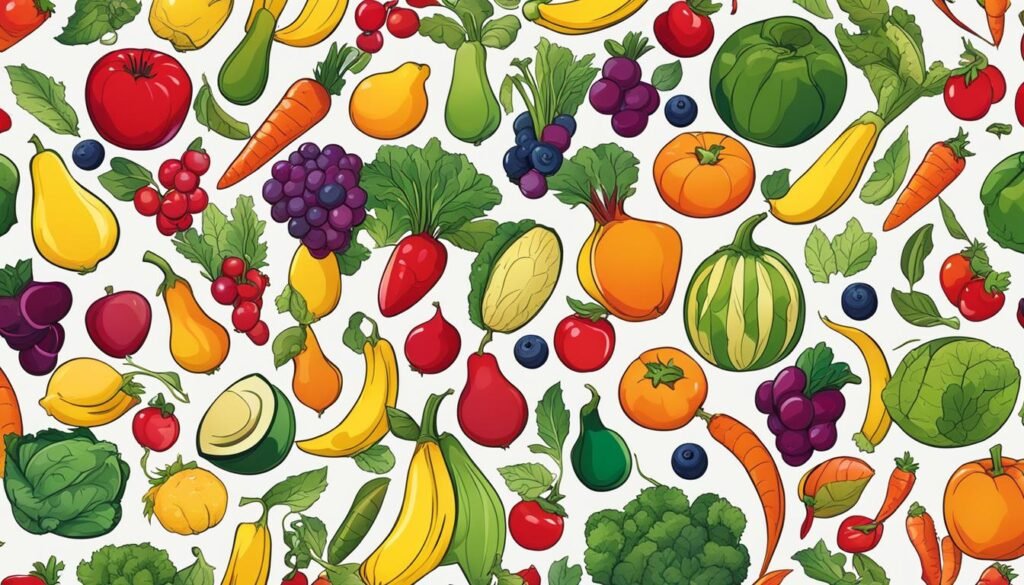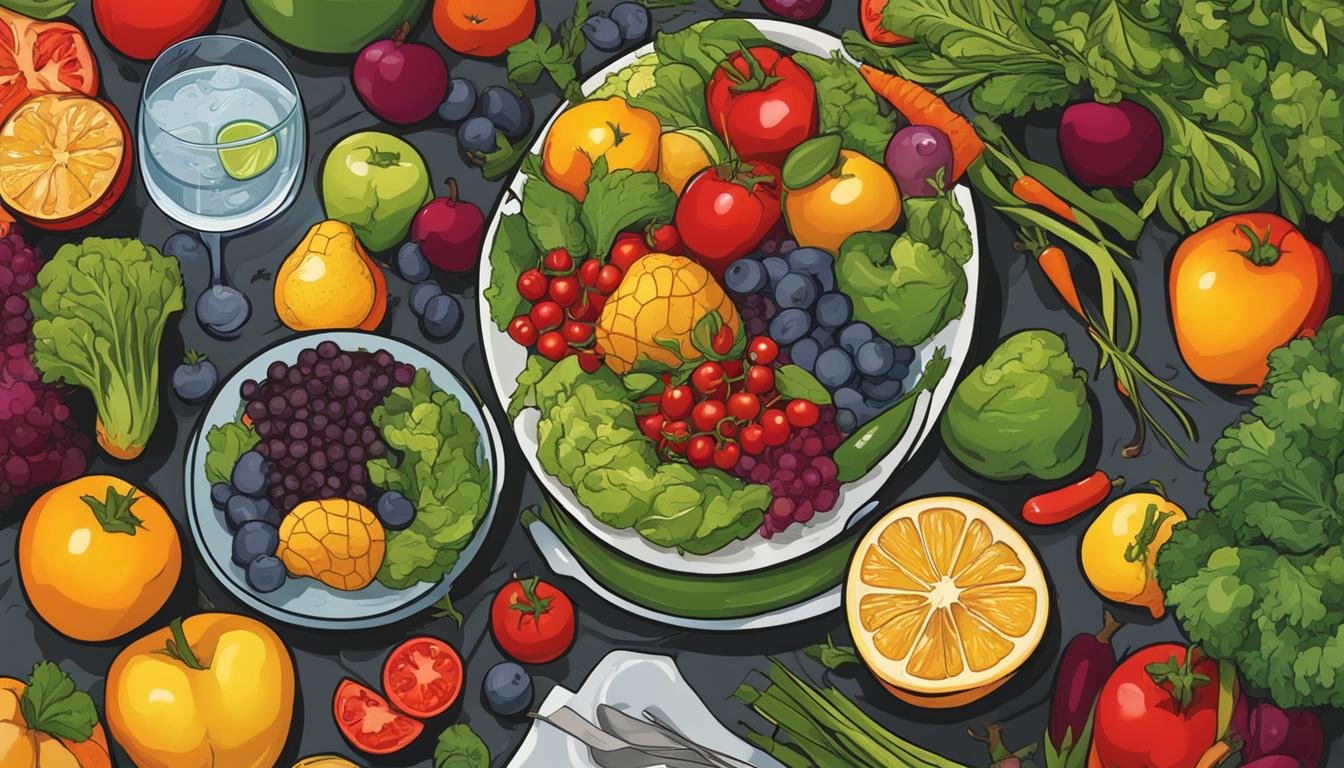A stress management diet can be a powerful tool for wellness, as excessive stress can negatively impact health. Certain foods can help reduce stress levels and promote overall well-being. Choosing a healthy diet can support the immune system, lower blood pressure, and help counter the negative effects of stress. By incorporating stress-busting foods into your diet, you can take proactive steps to prevent stress-related health issues.
Key Takeaways:
- Choosing a healthy diet can support stress management and overall well-being
- Including stress-busting foods in your diet can help reduce stress levels
- A well-balanced diet can support the immune system and lower blood pressure
- Stress prevention through diet is an effective way to prevent stress-related health issues
- Incorporating stress-reducing foods into your meals and snacks can promote overall wellness
The Impact of Carbohydrates on Stress
Carbohydrates play a significant role in regulating stress levels. Not all carbohydrates are created equal when it comes to their impact on stress. Complex carbs, such as whole-grain bread, pasta, and oatmeal, are known for their stress-relieving properties. These foods prompt the brain to produce serotonin, a calming neurotransmitter that helps stabilize mood and promote a sense of well-being.
Table: Complex Carbohydrates for Stress Relief
| Food | Benefits |
|---|---|
| Whole-grain bread | Provides a steady supply of serotonin and helps stabilize blood sugar levels |
| Pasta | Supports the production of serotonin and promotes a sense of calmness |
| Oatmeal | Contains complex carbs that stimulate serotonin production, aiding in stress reduction |
On the other hand, simple carbs like sweets and soda can provide a short-term spike in serotonin but may lead to a crash later on, negatively affecting blood sugar levels and exacerbating stress. It’s essential to choose complex carbohydrates as part of a balanced diet to promote stress relief and overall well-being.
By incorporating stress-busting complex carbs into your meals, you can support your body’s ability to manage stress and promote a sense of calmness and stability.

Stress-Reducing Vitamins and Minerals
When it comes to managing stress, incorporating stress-reducing vitamins and minerals into your diet can be highly beneficial. These essential nutrients can help support your body’s natural stress response and promote overall well-being. Two key players in stress reduction are vitamin C and magnesium.
The Power of Vitamin C
Vitamin C is known for its immune-boosting properties, but it also plays a crucial role in stress relief. This powerful antioxidant helps to curb the production of stress hormones like cortisol, which can have a negative impact on both our physical and mental health. Citrus fruits such as oranges, grapefruits, and lemons are excellent sources of vitamin C. Including these fruits in your diet can provide a refreshing and stress-reducing boost.
Magnesium for Stress Relief
Magnesium is a vital mineral that can help alleviate stress symptoms. It plays a key role in regulating nerve function and promoting relaxation. Foods rich in magnesium, such as spinach, soybeans, and salmon, can help prevent headaches and fatigue associated with stress. By incorporating these magnesium-rich foods into your meals, you can support your body’s stress management capabilities.
| Vitamin C-Rich Foods | Magnesium-Rich Foods |
|---|---|
| Oranges | Spinach |
| Grapefruits | Soybeans |
| Lemons | Salmon |
By incorporating stress-reducing vitamins like vitamin C and minerals like magnesium into your diet, you can support your body’s natural stress response and promote overall well-being. Remember to consult with a healthcare professional or registered dietitian before making any significant changes to your diet or adding supplements to ensure they align with your individual needs and circumstances.

The Role of Omega-3 Fatty Acids
Omega-3 fatty acids play a crucial role in stress reduction and overall well-being. These essential fats are found in fatty fish like salmon, tuna, and sardines. Incorporating these omega-3-rich foods into your diet can provide numerous health benefits and aid in stress relief.
Research has shown that omega-3 fatty acids can help prevent surges in stress hormones, such as cortisol. By consuming fatty fish regularly, you can support your body’s natural stress response and reduce the negative effects of chronic stress. Additionally, omega-3 fatty acids have been linked to a lower risk of heart disease, depression, and premenstrual syndrome (PMS).
| Omega-3 Fatty Acid Benefits | Food Sources |
|---|---|
| Reduced stress hormone levels | Fatty fish: salmon, tuna, sardines |
| Protection against heart disease | Fatty fish: salmon, tuna, sardines |
| Support for mental health | Fatty fish: salmon, tuna, sardines |
Including fatty fish in your diet can provide a healthy supply of omega-3 fatty acids and contribute to stress reduction. Aim for at least two servings of fatty fish per week to reap the benefits. If you’re not a fan of fish, you can also consider omega-3 supplements, such as fish oil capsules or algae-based supplements. However, it’s always best to consult with a healthcare professional before starting any new supplement regimen.
“Omega-3 fatty acids have been extensively studied for their positive effects on stress reduction and overall health. Including fatty fish in your diet is a simple and effective way to support your body’s stress response and promote well-being.” – Dr. Jane Smith, Nutritionist
The Calming Effects of Black Tea
When it comes to finding natural remedies for stress relief, black tea can be a soothing and enjoyable option. Studies have shown that drinking black tea may help reduce stress levels and promote quicker recovery from stressful events. One of the key components of black tea is its ability to lower levels of the stress hormone cortisol, which is associated with feelings of anxiety and tension.
Black tea contains a compound called L-theanine, which has been found to have calming effects on the brain. L-theanine increases alpha brain wave activity, which is linked to a state of relaxation and mental clarity. This can help reduce feelings of stress and promote a sense of calmness.
In addition to its stress-relieving properties, black tea is also rich in antioxidants that can support overall health and well-being. Antioxidants help protect the body against oxidative stress, which is a common side effect of chronic stress. By incorporating black tea into your daily routine, you can not only enjoy a moment of relaxation but also provide your body with valuable nutrients.
Why not green tea or herbal tea?
While green tea and herbal teas offer their own health benefits, black tea specifically has been shown to have unique stress-relieving properties. The combination of L-theanine, antioxidants, and the comforting ritual of enjoying a warm cup of tea can make black tea an effective tool for managing stress.
So the next time you’re feeling overwhelmed or in need of a calming break, consider reaching for a cup of black tea. Whether you enjoy it hot or iced, black tea can provide a moment of tranquility and help you navigate the challenges of modern life with a renewed sense of calmness.
Benefits of Nuts and Seeds for Stress Reduction
Incorporating nuts and seeds into your diet can provide numerous benefits for stress reduction. These healthy and nutrient-rich foods are packed with essential vitamins, minerals, and healthy fats that support overall well-being.
Nuts such as pistachios, walnuts, and almonds are rich in omega-3 fatty acids, which have been shown to help reduce stress hormones and promote a sense of calm. Additionally, they are a great source of magnesium, a mineral known for its stress-reducing properties. Magnesium helps relax muscles and contributes to a sense of relaxation and tranquility.
Seeds like chia seeds, flaxseeds, and pumpkin seeds are also excellent additions to a stress-reducing diet. They are high in healthy fats, including omega-3 fatty acids, which help reduce inflammation and promote healthy brain function. These seeds are also rich in antioxidants, vitamins, and minerals that support overall health and well-being.
The Benefits of Nuts and Seeds for Stress Reduction
| Nut/Seed | Key Benefits |
|---|---|
| Pistachios | Rich in healthy fats and antioxidants, which promote relaxation and reduce stress levels. |
| Walnuts | High in omega-3 fatty acids and antioxidants that support brain health and reduce inflammation. |
| Almonds | Abundant in magnesium, which helps relax muscles and contributes to stress reduction. |
| Chia Seeds | Provide omega-3 fatty acids, fiber, and antioxidants that support overall well-being and stress management. |
| Flaxseeds | Rich in omega-3 fatty acids and lignans, which have been shown to reduce stress and promote heart health. |
| Pumpkin Seeds | High in antioxidants, magnesium, and tryptophan, which can help improve mood and reduce stress. |
When incorporating nuts and seeds into your diet, it’s important to consume them in moderation due to their high calorie content. A handful of nuts or a tablespoon of seeds can provide the benefits without adding excessive calories to your overall daily intake. Consider adding a variety of nuts and seeds to your meals, snacks, or even as toppings for salads and yogurt to enjoy their stress-reducing benefits.
The Power of Avocado in Stress Prevention
When it comes to managing stress, incorporating avocado into your diet can be a wise choice. Avocado is a potassium-rich food that can help prevent high blood pressure, which is often associated with stress. In fact, half an avocado contains more potassium than a medium-sized banana. By including avocado in your meals and snacks, you can support your body’s ability to manage stress and promote overall well-being.
While avocado offers numerous health benefits, it’s important to be mindful of portion sizes due to its high fat and calorie content. Enjoying a moderate amount of avocado, such as a few slices or adding it to salads, can provide the stress-relieving benefits without overloading on calories.
To give you a better idea of the potassium content in avocado, here’s a table comparing the potassium levels in different foods:
| Food | Potassium Content (per 100g) |
|---|---|
| Avocado | 485mg |
| Banana | 358mg |
| Spinach | 558mg |
| Salmon | 628mg |
As you can see, avocado is a potassium powerhouse, making it a valuable addition to your stress management diet. By incorporating avocado and other potassium-rich foods into your daily meals, you can take proactive steps to prevent stress-related health issues and support your overall well-being.
The Role of Almonds in Resilience to Stress
When it comes to stress management, incorporating almonds into your diet can play a significant role in building resilience. These nutrient-packed nuts offer a range of vitamins that support stress management and overall well-being.
One key nutrient found in almonds is vitamin E. This powerful antioxidant supports the immune system and helps protect cells from oxidative stress caused by free radicals. Vitamin E has been shown to enhance resilience during periods of stress or depression, making almonds a valuable addition to a stress management diet.
In addition to vitamin E, almonds are also rich in B vitamins. These vitamins, including B6 and folate, are essential for maintaining proper brain function and supporting healthy nerve cells. During times of stress, the body requires higher levels of B vitamins to help regulate the production of stress hormones and neurotransmitters.
By consuming a quarter cup of almonds daily, you can benefit from the stress-reducing properties of these nuts. Be mindful of portion sizes, as almonds are high in fat and calories. However, when enjoyed in moderation, almonds can provide a nutritious and delicious snack that supports stress management and resilience.
| Nutrient | Amount per 1/4 cup of almonds (28g) |
|---|---|
| Vitamin E | 7.3 mg (37% DV) |
| Vitamin B6 | 0.1 mg (6% DV) |
| Folate | 12 mcg (3% DV) |
“Incorporating a quarter cup of almonds into your daily routine can provide a rich source of vitamin E and B vitamins, supporting your body’s ability to manage stress and build resilience.”
Stress-Reducing Mechanisms of Raw Vegetables
Raw vegetables can be an effective tool in managing stress due to their unique mechanical effects on the body. Munching on crunchy celery and carrot sticks can help release tension in the jaw, providing a physical release that can reduce feelings of stress and tension. The act of chewing also stimulates the release of endorphins, which are known as the body’s natural feel-good chemicals. Incorporating raw vegetables into your diet can provide a simple yet effective way to manage stress.
When we eat raw vegetables, not only do we benefit from their nutritional content, but their natural fiber content also contributes to relieving stress. Fiber-rich foods like raw vegetables help regulate digestion and promote a healthy gut. A healthy gut is crucial for overall well-being, as it is directly linked to our mood and emotional state. By supporting gut health through the consumption of raw vegetables, we can indirectly manage stress levels and promote emotional balance.
Here is a simple table highlighting some stress-relieving raw vegetables:
| Vegetable | Benefits |
|---|---|
| Carrots | Rich in beta-carotene and antioxidants that help reduce oxidative stress |
| Celery | Contains phytonutrients that have calming properties and can help lower blood pressure |
| Cucumbers | High water content provides a refreshing and hydrating effect, promoting a sense of calm |
| Bell Peppers | Loaded with vitamin C, which can reduce stress hormones and boost immune function |
By consciously incorporating these raw vegetables into our diet, we can not only nourish our bodies but also support our overall mental and emotional well-being. Remember to thoroughly wash raw vegetables before consumption, and if possible, opt for organic options to minimize exposure to pesticides and other chemicals.
Conclusion
A well-balanced diet plays a crucial role in preventing stress-related health issues. By incorporating stress-busting foods into your meals and snacks, you can support your body’s ability to manage stress and promote overall well-being.
Choosing a diet rich in complex carbs, such as whole-grain bread, pasta, and oatmeal, can help stabilize blood sugar levels and stimulate the production of calming neurotransmitters. Including fruits and vegetables, like oranges, spinach, and avocados, can provide stress-reducing vitamins and minerals, strengthen the immune system, and prevent high blood pressure.
Fatty fish, such as salmon and tuna, containing omega-3 fatty acids, have been shown to help prevent surges in stress hormones and protect against heart disease and depression. Additionally, incorporating black tea and nuts/seeds into your diet can contribute to stress reduction and overall stress management.
To optimize the effectiveness of a stress prevention diet, remember to practice other stress-reducing techniques like exercise, mindfulness, and seeking social support. Prioritizing a healthy diet and stress management techniques empowers us to take control of our health and well-being.
FAQ
What is the role of carbohydrates in managing stress?
Carbohydrates, particularly complex carbs like whole-grain bread and oatmeal, can prompt the brain to produce serotonin, a calming neurotransmitter. These foods provide a steady supply of serotonin and help stabilize blood sugar levels, promoting stress relief.
Which vitamins and minerals can help reduce stress?
Vitamin C, found in citrus fruits, can curb stress hormones and strengthen the immune system. Magnesium, abundant in spinach and salmon, can prevent headaches and fatigue associated with stress.
How do omega-3 fatty acids contribute to stress reduction?
Omega-3 fatty acids, found in fatty fish like salmon and tuna, can help prevent surges in stress hormones. They may also protect against heart disease, depression, and premenstrual syndrome (PMS).
Can black tea help reduce stress levels?
Yes, studies have shown that black tea can lead to feelings of calmness and lower levels of the stress hormone cortisol. Drinking black tea can be a soothing and enjoyable way to manage stress.
What are the benefits of nuts and seeds for stress reduction?
Nuts and seeds, such as pistachios, walnuts, and almonds, are rich in healthy fats that can support stress reduction. They can also lower cholesterol, ease inflammation in the heart’s arteries, and protect against the effects of stress.
How can avocado contribute to stress prevention?
Avocado is a potassium-rich food that can help prevent high blood pressure, which is often associated with stress. Including avocado in your diet can be a beneficial choice when seeking stress-relieving foods.
What is the role of almonds in resilience to stress?
Almonds contain vitamin E, which supports the immune system, and B vitamins that can enhance resilience during periods of stress or depression. Consuming a quarter cup of almonds daily can provide these beneficial vitamins and support overall stress management.
How do raw vegetables help reduce stress?
Munching on raw vegetables, such as celery and carrot sticks, can release tension in the jaw, reducing feelings of stress and tension in a purely mechanical way. Incorporating raw vegetables into your diet can provide a simple yet effective way to manage stress.
How does a stress prevention diet contribute to overall well-being?
A well-balanced diet that includes stress-busting foods can support the immune system, lower blood pressure, and counter the negative effects of stress on health. By prioritizing a healthy diet, you can take proactive steps to prevent stress-related health issues.






